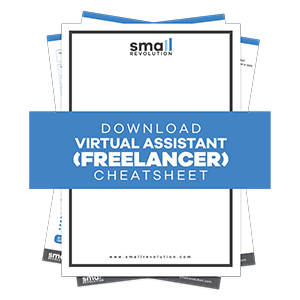Douglas is a top-rated freelance editor on Upwork. He was featured on Upwork’s April list of top editors and charges $30 per hour for his services.
His Upwork profile is filled with positive client reviews, praising his work and wishing they had more work to give him.
You must be wondering, how can you break into the editing industry and become as successful as Douglas?
Fortunately, you only need to focus on these three aspects:
- Your skills
- Professional development
- Job searching
Small Revolution offers resources to help you become a skilled editor, but this is only the beginning of breaking into the editing industry.
1: Assess Your Skills

Douglas acknowledges that editing requires a high standard of written English. Therefore, beginner editors should assess their written English skills if they want to break into the industry.
To conduct this assessment, compare your work to industry standards and identify areas that need improvement. Having an objective view of yourself and your work is crucial.
If you spend time researching, writing, and editing various topics, you will easily identify areas where your editing skills fall short of industry standards.
Editing Skills
An effective editing process should produce content that fulfills its communicative intent. The final edit should be logical, coherent, readable, and of appropriate length.
You may be wondering, “How do I assess myself for all these parameters?”
Here’s how it works, analyze your work objectively and check whether it fulfills the following criteria:
- Fluency. This is the ability to translate your thoughts into written words. When assessing fluency, focus on your proficiency in editing increasingly longer compositions that express an original idea in at least one paragraph.
- Organization and structure. This refers to the clarity, cohesion, accuracy, and originality of your editing. Ensure that the task has a clear introduction and conclusion, showcases a central idea, and keeps the reader engaged through well-paced writing and effective transitions.
- Mechanics and readability. For your editing to be readable, make sure it follows the standard conventions of written English, including spelling, punctuation, capitalization, and grammar. Even if your content is fluent, failing to adhere to these standards may turn off potential clients.
The criteria above will make your editing error-free. However, if you are unfamiliar with the topic at hand, you may end up producing shallow content.
The solution is simple, assess your research skills.
Research Skills
Research is all about asking relevant questions on a topic and picking the right answers.
A good editor is able to do this and use their editing skills to communicate the intended message.
To begin assessing your research skills, evaluate the information you find and ensure it is reliable, accurate, and appropriate for your content.
A Currency, Relevance, Authority, Accuracy, and Purpose (CRAAP) test will help you to conduct this evaluation. It is a list of questions with different criteria that evaluate the information you find in your research.
The table below outlines the CRAAP criteria and their respective questions.
| Criteria | Definition | Questions |
| Currency | Timeliness of the information |
|
| Relevance | Importance of the information |
|
| Authority | Source of the information |
|
| Accuracy | The reliability, truthfulness, and correctness of the information |
|
| Purpose | The reason why the information exists |
|
Every time you conduct research, the CRAAP questions show whether your research findings are reliable, accurate, and appropriate. If you fail the assessment, watch the video below and follow the steps to improve your research skills.
2: Build Your Reputation as an Editor
In addition to assessing your skills, you need to position yourself as a professional editor.
It can be challenging to find clients as a beginner editor. No client wants their work to be handled by a beginner editor unless they expect to pay peanuts.
With editors like Douglas in the industry, you need to show clients that you are dedicated and experienced.
You can do this by building a strong editing portfolio and a strong professional network.
Build a Strong Portfolio
Your portfolio should be different from a writer’s portfolio because as an editor, you are more of a content strategist than a creator.
In addition to showing how dedicated you are to the profession, your portfolio must show your approach to analyzing written content.
To develop a portfolio that will help you break into the industry, follow these steps:
Highlight your unique voice. While editors must adapt their style to match the client’s task, it’s important to showcase your unique voice in your portfolio.
Start with a short bio that describes your editing philosophy, approach to new assignments, and topics that interest you.
Demonstrate your thought process. Showcase previous tasks you have worked on, and include sidebar notes that highlight the decisions behind all the changes made. This will demonstrate your analytical approach to editing.
Showcase your coaching skills. Your biggest responsibility as an editor is to collaborate with writers and help them shape their stories based on your vision.
Include before and after versions of previous tasks you have worked on, as well as documents that show tracked changes. Make sure to sake the stepping stones that got you to the final piece of content.
Build a Strong Professional Network
Beginner editors need to work together to break into the industry. Therefore, it is important to establish contact with writers, editors, and editing clients to form a strong professional network.
Your network will keep you informed of changes in the editing industry, help you find work, develop your editing skills, and increase your client pool.
To help you get started, follow these steps:
Choose your preferred network. Do you want to connect with writers, fellow editors, or editing clients? Your answer will determine the approach you use to network. For example, if you want to connect with editing clients, you can follow Erin Brenner’s approach and find clients.
Rebrand your social media pages. Create or restructure your social media pages to showcase that you are an editor. If you brand your LinkedIn and Facebook pages as a freelance editor, you stand a high chance of attracting high-value editing clients.
Attend editing networking events. One event you can attend is the 11th IPED Conference. At this event, you can establish connections with editors, writers, and potential clients.
3: Find a Job
The final step of breaking into freelance editing is finding a job. Once your skills are in check and you have built your reputation, all you need is someone or a platform with a job for you.
You can either be employed by a writing website or work with individual clients.
Writing websites guarantee consistent work as long as you continually deliver quality edits.
Here’s how you find a job on one of the websites:
Visit either Proofreading services, Working Nomads, or Scribbr
Take note of their application requirements
Send an application that meets their requirements
If your application satisfies their requirements, they will add you to their team.
Alternatively, you can break into the industry by looking for individual clients online. They will not guarantee consistent work, but they will help you build your portfolio.
The best platforms to find new clients are social media and freelance websites.
Social Media
Joining relevant groups and channels can help with introductions into the online freelance editing industry.
The best groups and channels are on LinkedIn, Facebook, and Twitter.
- LinkedIn: CREA Content Marketing, Linguistics Jobs, and Work From Home New Reality
- Facebook: Cult of Copy Job Board, Editors Association of Earth, and Remarkable Freelance Writers in Africa
- Twitter: Job Board Direct, Writer’s Job Board, and Jobs For Editors
Clients regularly post jobs in these groups. All you need to do is apply for the advertised tasks every time they are posted.
But that’s not all. You also need to be active in these groups. Remember, you are competing against thousands of other group members.
The strong professional network you built can go a long way in establishing your presence on the platforms. Eventually, one of your applications will get you a job.
High-quality editing in your first job will break you into the industry.
Break Into the Industry
Small Revolution suggests that freelance editing can either be a full-time or a part-time job.
Help writers develop compelling content by assessing your skills, building your reputation, and finding a job.
If you are venturing into the writing industry for the first time, we recommend starting as a writer and honing your skills before progressing into editing.


